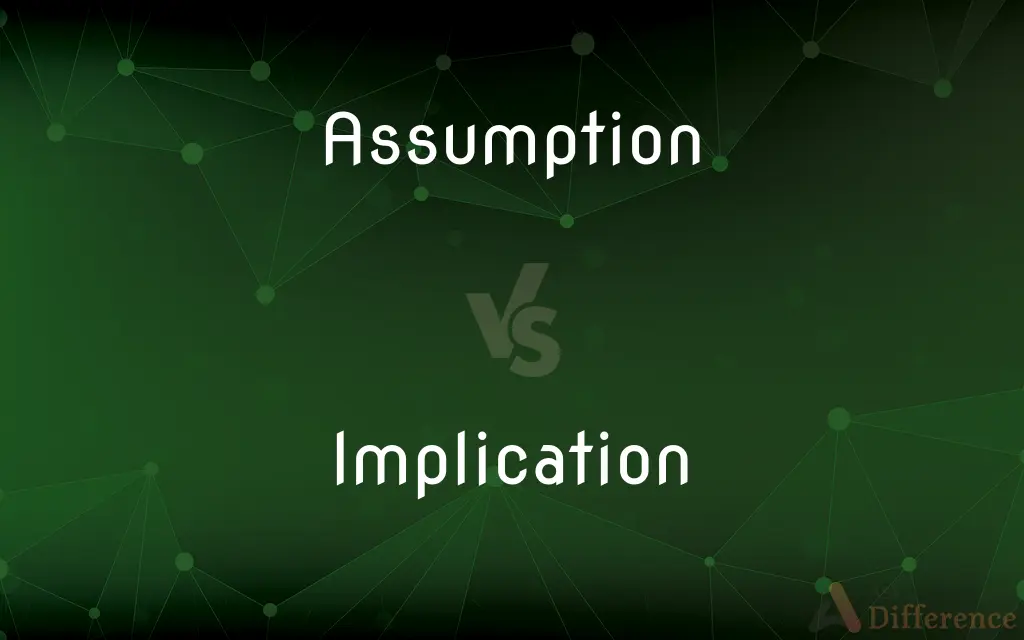Assumption vs. Implication — What's the Difference?
By Maham Liaqat & Fiza Rafique — Updated on March 11, 2024
An assumption is a belief taken as true without proof, while an implication is a conclusion that can be drawn from something, though it's not explicitly stated.

Difference Between Assumption and Implication
Table of Contents
ADVERTISEMENT
Key Differences
An assumption is a foundational idea or belief that is accepted as true without direct evidence or proof. It serves as a starting point for reasoning, argumentation, or decision-making processes. Assumptions can be explicit or implicit, but they are not directly supported by the presented information. On the other hand, an implication is an indirect indication or suggestion that is not explicitly stated but can be inferred from the available information or statements. Implications extend the meaning of what is communicated, offering additional insights or conclusions that follow logically from the data or statements made.
Assumptions are critical in forming the basis of hypotheses in research, guiding the development of theories, models, and frameworks. They fill in gaps in knowledge to make reasoning or analysis possible. Implications, whereas, are outcomes or consequences that logically follow from statements or actions. They reveal the potential effects, meanings, or significance of an argument, decision, or finding within a broader context.
While assumptions are necessary for any analytical process to proceed by providing a foundation on which arguments and theories are built, implications are derived from the analysis, offering insights into the significance, potential consequences, or broader meanings of the findings or statements. Assumptions lay the groundwork, and implications point toward the consequences or broader meanings of those assumptions and any associated arguments or findings.
Assumptions often require validation or verification, especially in research or decision-making processes, to ensure their appropriateness and accuracy. Implications, on the other hand, require careful interpretation and analysis to understand their full impact, significance, or the nuances they add to an argument or situation.
Assumptions are about the unstated starting points we accept as true for the sake of argument or analysis, while implications are about the unstated but logically inferred consequences, meanings, or insights that emerge from the explicitly stated information.
ADVERTISEMENT
Comparison Chart
Definition
A belief accepted as true without evidence
A conclusion that is not explicitly stated but is suggested or inferred
Role
Serves as a foundational idea or starting point
Indicates potential effects, meanings, or significance
Origin
Predetermined or accepted prior to analysis
Derived from analysis or interpretation of information
Requirement
Validation or verification in some contexts
Careful interpretation to understand impact or significance
Purpose
To enable reasoning or analysis
To extend understanding or provide insights into consequences
Compare with Definitions
Assumption
A fact or statement taken for granted without proof.
The assumption that the market would continue to grow influenced their investment strategy.
Implication
A conclusion that can be drawn from something although it is not explicitly stated.
The implication of his silence was that he agreed with the decision.
Assumption
A supposition made without complete evidence.
They made an assumption about consumer behavior without market research.
Implication
An indirect indication or suggestion.
The CEO's remarks carried implications for the company's future direction.
Assumption
An underlying principle that is not questioned or verified.
His argument was based on the assumption that all members would agree.
Implication
A logical deduction from a set of statements.
From her statement, the implication was clear: no further funding would be provided.
Assumption
A prerequisite for an argument or theory to hold.
The theory operates under the assumption of perfect information.
Implication
The consequence or effect of an action or statement.
The policy changes have significant implications for small businesses.
Assumption
A precondition accepted to facilitate analysis.
For the sake of calculation, we'll make the assumption that inflation remains steady.
Implication
An insight or meaning inferred from information.
The study's findings have profound implications for the field of genetic research.
Assumption
A thing that is accepted as true or as certain to happen, without proof
They made certain assumptions about the market
We're working on the assumption that the time of death was after midnight
Implication
The conclusion that can be drawn from something although it is not explicitly stated
The implication is that no one person at the bank is responsible
Assumption
The action of taking on power or responsibility
The assumption of an active role in regional settlements
Implication
The action or state of being involved in something
Our implication in the problems
Assumption
The reception of the Virgin Mary bodily into heaven. This was formally declared a doctrine of the Roman Catholic Church in 1950.
Implication
The act of implicating or the condition of being implicated.
Assumption
Arrogance or presumption.
Implication
The act of implying or the condition of being implied.
Assumption
The act of taking to or upon oneself
Assumption of an obligation.
Implication
An indirect indication; a suggestion.
Assumption
The act of taking possession or asserting a claim
Assumption of command.
Implication
An implied meaning; implicit significance.
Assumption
The act of taking for granted
Assumption of a false theory.
Implication
An inference. See Usage Note at infer.
Assumption
Something taken for granted or accepted as true without proof; a supposition
A valid assumption.
Implication
(uncountable) The act of implicating.
Assumption
(Archaic) Presumption; arrogance.
Implication
(uncountable) The state of being implicated.
Assumption
(Logic) A minor premise.
Implication
(countable) A possible effect or result of a decision or action.
Assumption
Assumption(Christianity)The taking up of the Virgin Mary into heaven in body and soul after her death, observed as a feast on August 15.
Implication
An implying, or that which is implied, but not expressed; an inference, or something which may fairly be understood, though not expressed in words.
Assumption
The act of assuming, or taking to or upon oneself; the act of taking up or adopting.
His assumption of secretarial duties was timely.
Implication
The connective in propositional calculus that, when joining two predicates A and B in that order, has the meaning "if A is true, then B is true".
Assumption
The act of taking for granted, or supposing a thing without proof; a supposition; an unwarrantable claim.
Their assumption of his guilt disqualified them from jury duty.
Implication
Logical consequence. en
Assumption
The thing supposed; a postulate, or proposition assumed; a supposition.
Implication
The act of implicating, or the state of being implicated.
Three principal causes of firmness are. the grossness, the quiet contact, and the implication of component parts.
Assumption
(logic) The minor or second proposition in a categorical syllogism.
Implication
An implying, or that which is implied, but not expressed; an inference, or something which may fairly be understood, though not expressed in words.
Whatever things, therefore, it was asserted that the king might do, it was a necessary implication that there were other things which he could not do.
Assumption
The taking of a person up into heaven.
Implication
Something that is inferred (deduced or entailed or implied);
His resignation had political implications
Assumption
A festival in honor of the ascent of the Virgin Mary into heaven, celebrated on 15 August.
Implication
A meaning that is not expressly stated but can be inferred;
The significance of his remark became clear only later
The expectation was spread both by word and by implication
Assumption
(rhetoric) Assumptio.
Implication
An accusation that brings into intimate and usually incriminating connection
Assumption
The act of assuming, or taking to or upon one's self; the act of taking up or adopting.
The assumption of authority.
Implication
A logical relation between propositions p and q of the form `if p then q'; if p is true then q cannot be false
Assumption
The act of taking for granted, or supposing a thing without proof; supposition; unwarrantable claim.
This gives no sanction to the unwarrantable assumption that the soul sleeps from the period of death to the resurrection of the body.
That calm assumption of the virtues.
Implication
A relation implicated by virtue of involvement or close connection (especially an incriminating involvement);
He was suspected of implication in several robberies
Assumption
The thing supposed; a postulate, or proposition assumed; a supposition.
Hold! says the Stoic; your assumption's wrong.
Assumption
The minor or second proposition in a categorical syllogism.
Assumption
The taking of a person up into heaven.
Assumption
A statement that is assumed to be true and from which a conclusion can be drawn;
On the assumption that he has been injured we can infer that he will not to play
Assumption
A hypothesis that is taken for granted;
Any society is built upon certain assumptions
Assumption
The act of taking possession of or power over something;
His assumption of office coincided with the trouble in Cuba
The Nazi assumption of power in 1934
He acquired all the company's assets for ten million dollars and the assumption of the company's debts
Assumption
Celebration in the Roman Catholic Church of the Virgin Mary's being taken up into heaven when her earthly life ended; corresponds to the Dormition in the Eastern Orthodox church
Assumption
Audacious (even arrogant) behavior that you have no right to;
He despised them for their presumptuousness
Assumption
(Christianity) the taking up of the body and soul of the Virgin Mary when her earthly life had ended
Assumption
The act of assuming or taking for granted;
Your assumption that I would agree was unwarranted
Common Curiosities
Can implications become assumptions in other contexts?
Yes, implications from one context can be taken as assumptions in another, depending on the scope of analysis or argumentation.
Why are assumptions important?
Assumptions provide a necessary foundation for reasoning, analysis, and decision-making by filling in gaps in knowledge.
What is an assumption?
An assumption is a belief or statement taken as true without requiring proof, serving as a basis for reasoning or analysis.
Are assumptions always explicit?
No, assumptions can be both explicit and implicit, depending on whether they are directly stated or merely accepted without being mentioned.
What is an implication?
An implication is a conclusion or meaning that is not directly stated but can be inferred from the given information or circumstances.
How should implications be handled in research?
Implications in research should be carefully analyzed and discussed to understand their significance and potential impact on the field.
Can the validity of an assumption affect conclusions?
Yes, the validity of assumptions can significantly impact the accuracy and reliability of conclusions drawn from them.
How do assumptions and implications affect decision-making?
Assumptions provide the basis for decision-making processes, while implications inform the potential consequences of those decisions.
How do assumptions differ from implications?
Assumptions are accepted beliefs or premises without proof, while implications are indirect conclusions or meanings derived from statements or facts.
How can one identify implications?
Identifying implications requires critical thinking and analysis to infer meanings or conclusions not directly stated.
Is it necessary to question assumptions?
Yes, questioning assumptions is crucial in critical thinking, research, and decision-making to ensure their appropriateness and validity.
How can one effectively communicate implications?
Effectively communicating implications involves clear and logical reasoning to guide the audience from stated information to inferred conclusions.
What role do implications play in communication?
Implications enrich communication by suggesting additional meanings or consequences that extend beyond the explicit content.
Can assumptions lead to biased conclusions?
Yes, if assumptions are unfounded or biased, they can lead to inaccurate or biased conclusions.
Why is it important to distinguish between assumptions and implications?
Distinguishing between them is essential for clear reasoning, effective communication, and accurate interpretation of information.
Share Your Discovery

Previous Comparison
Nucleotide vs. Base
Next Comparison
Needle vs. SwordAuthor Spotlight
Written by
Maham LiaqatCo-written by
Fiza RafiqueFiza Rafique is a skilled content writer at AskDifference.com, where she meticulously refines and enhances written pieces. Drawing from her vast editorial expertise, Fiza ensures clarity, accuracy, and precision in every article. Passionate about language, she continually seeks to elevate the quality of content for readers worldwide.
















































